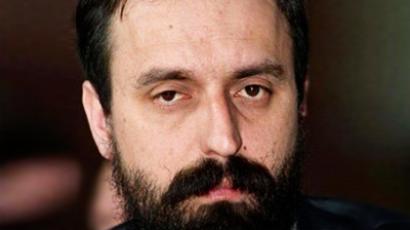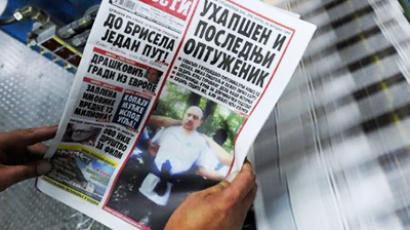Rising tension between Pristina and Serb-populated north
Kosovo has sent its special forces to the Serb-populated north after a tit-for-tat trade ban caused tensions to flare up. Two policemen have been wounded as a result of major unrest.
Kosovo police seized control of one border crossing, while the other two are being blocked by local Serbs.Earlier it was reported that a Kosovo police officer was seriously wounded after an ambush in Kosovo's north. The policeman was shot in a firefight near the northern town of Zubin Potok, during a police operation to extend the writ of the Kosovo government in the Serb-controlled north.Another officer was wounded in a grenade attack as Serb demonstrators tried to block the operation, which was launched late on Monday and is aimed at taking control of two disputed border crossings with Serbia. Political analyst Aleksandr Pavic explains the trade dispute between Pristina and Belgrade is behind the current unrest in the region.“Kosovo authorities actually instituted a trade ban on all imports from Serbia. So actually they instituted a one-sided measure and this was seen in Belgrade and by the Kosovo Serbs as pressure from the government in Pristina to make them actually accept their role in the so-called independent Kosovo,” he said. Kosovo's move has been widely condemned by the UN and the EU, among others, and it is feared it will stoke ethnic anger.On Tuesday Maja Kocijancic, an EU representative, criticized the Kosovo authorities for not consulting international mediators before launching the offensive. She expressed the hope that peace and order in the region will soon be reinstated. EU forces are slowly moving out and handing over to the Kosovans, who are already calling for more aggressive action against the Serbs, who don't recognize Kosovo authorities. The situation in the region has been a major headache for the EU, explains Balkans expert Nebojsa Malic.“Europe should be concerned by this threat but it’s a threat of Europe’s making. The EU has made things unimaginably worse by recognizing a regime that has proven it has absolutely no interest in any sort of dialogue. It came to power through violence, it has conducted widespread ethnic cleansings of Serbs and other non-Albanian populations, it has been rewarded for a widespread pogrom of Serbs in March 2004, and it has basically shown no willingness to behave in a civilized fashion,” he says.
Balkans political expert Marko Gasic told RT that the real puppet-masters are further afield, and Pristina’s Albanian leaders could not have done anything without authorization from the US.“We know that the US has got a massive investment in Kosovo. It’s got the biggest military base in the world in Camp Bondsteel smack-bang in the heart of Kosovo,” he said. “And so everything that the Pristina cabal gets up to is authorized by Washington in the first place. So we know who can stop it. And it is time that the US administration stopped its extremist puppets in Pristina from even further expanding into Serbian union recognized territorial area.”
Kosovo proclaimed its independence in 2008 when it unilaterally split from Serbia. Some 600,000 Serbs still live in the region, but refuse to recognize Kosovan sovereignty.Kosovo's independence has been a bone of contention between Serbia and the EU, which is pressing Belgrade to recognize Kosovo before it can obtain official member candidate status.














